| Oracle® Database PL/SQL Language Reference 11g Release 2 (11.2) Part Number E10472-02 |
|
|
View PDF |
| Oracle® Database PL/SQL Language Reference 11g Release 2 (11.2) Part Number E10472-02 |
|
|
View PDF |
An expression is an arbitrarily complex combination of operands (variables, constants, literals, operators, function calls, and placeholders) and operators. The simplest expression is a single variable.
The PL/SQL compiler determines the data type of an expression from the types of the operands and operators that comprise the expression. Every time the expression is evaluated, a single value of that type results.
Topics:
Syntax
expression ::=
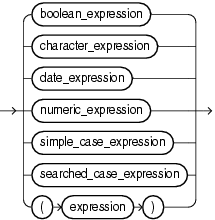
See:
boolean_expression ::=
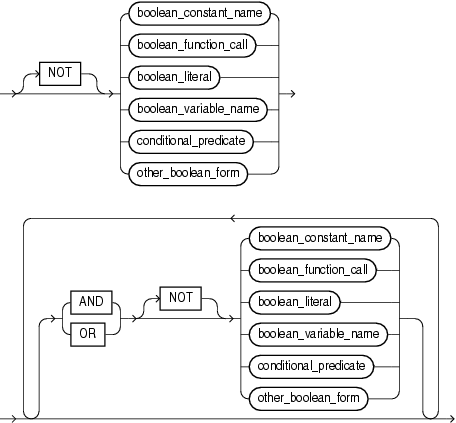
See function_call ::=.
conditional_predicate ::=

other_boolean_form ::=
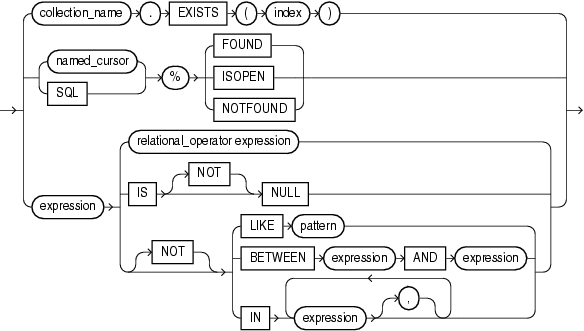
character_expression ::=
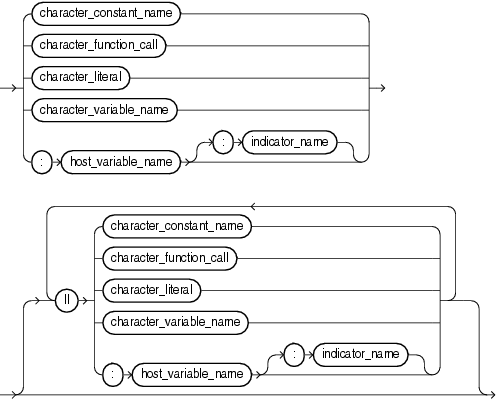
See function_call ::=.
date_expression ::=
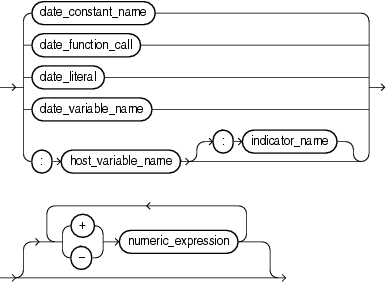
See function_call ::=.
numeric_expression ::=
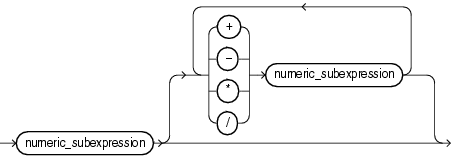
numeric_subexpression ::=
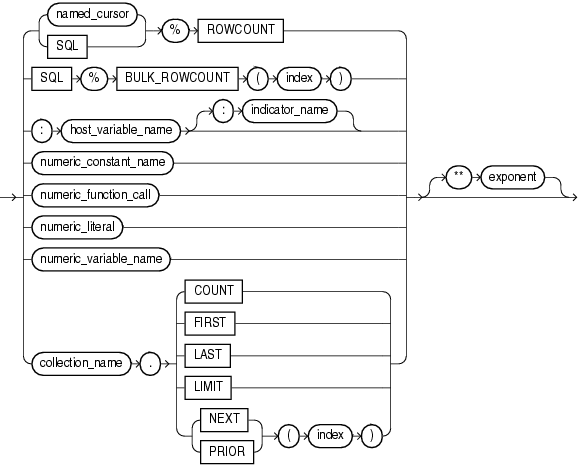
See:
function_call ::=

simple_case_expression ::=
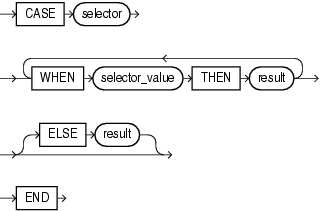
searched_case_expression ::=
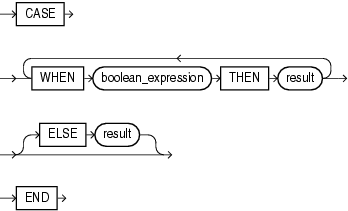
Semantics
BETWEEN
See "BETWEEN Operator".
boolean_constant_name
The name of a constant of type BOOLEAN.
boolean_expression
An expression whose value is TRUE, FALSE, or NULL. For more information, see "BOOLEAN Expressions".
Restriction on boolean_expression Because SQL has no data type equivalent to BOOLEAN, you cannot:
Assign a BOOLEAN expression to a database table column
Select or fetch the value of a database table column into a BOOLEAN variable
Use a BOOLEAN expression in a SQL statement, built-in SQL function, or PL/SQL function invoked from a SQL statement
boolean_function_call
A call to a function that returns a BOOLEAN value.
boolean_literal
The predefined value TRUE, FALSE, or NULL.
boolean_variable_name
The name of a variable of type BOOLEAN.
%BULK_ROWCOUNT
An attribute of the implicit cursor SQL for use with the FORALL statement. See SQL%BULK_ROWCOUNT.
character_constant_name
The name of a constant that stores a character value.
character_expression
An expression whose value is a character or character string.
character_function_call
A call to a function that returns either a character value or a value that can be implicitly converted to a character value.
character_literal
A literal whose value is either a character value or a value that can be implicitly converted to a character value.
character_variable_name
The name of a variable that stores a character value.
collection_name
The name of a collection.
date_constant_name
The name of a constant that stores a date value.
date_expression
An expression that returns a datetime value.
date_function_call
A function call that returns either a date value or a value that can be implicitly converted to a date value.
date_literal
A literal whose value is either a date value or a value that can be implicitly converted to a date value.
date_variable_name
The name of a variable that stores a date value.
EXISTS, COUNT, FIRST, LAST, LIMIT, NEXT, PRIOR
Collection methods described in "Collection Method Call".
exponent
An expression whose value is numeric.
%FOUND, %ISOPEN, %NOTFOUND, %ROWCOUNT
Cursor attributes described in "Implicit Cursor Attribute" and "Named Cursor Attribute".
host_variable_name
The name of a variable declared in a PL/SQL host environment and passed to PL/SQL as a bind argument. Do not put space between the colon (:) and host_variable_name.
IN
See "IN Operator".
index
A numeric expression whose value is of type PLS_INTEGER or a value that can be implicitly converted to PLS_INTEGER (see Table 3-10, "Possible Implicit PL/SQL Data Type Conversions").
indicator_name
The name of an indicator variable declared in a PL/SQL host environment and passed to PL/SQL as a bind argument. An indicator variable indicates the value or condition of its associated host variable (for example, in the Oracle Precompiler environment, an indicator variable can a detect null or truncated value in an output host variable). Do not put space between host_variable_name and the colon (:) or between the colon and indicator_name. This is correct:
:host_variable_name:indicator_name
INSERTING, UPDATING, DELETING
See "Conditional Predicates for Detecting the DML Operation that Fired a Trigger".
IS [NOT] NULL
LIKE pattern
See "LIKE Operator".
NOT, AND, OR
See "Logical Operators".
numeric_constant_name
The name of a constant that stores a numeric value.
numeric_expression
An expression that returns a numeric value.
numeric_function_call
A call to a function that returns either a numeric value or a value that can be implicitly converted to a numeric value.
numeric_literal
A literal whose value is either a numeric value or a value that can be implicitly converted to a numeric value.
numeric_variable_name
The name of variable that stores a numeric value.
parameter [, parameter ]...
List of actual parameters for the function being called. The data type of each actual parameter must be compatible with the data type of the corresponding formal parameter (see Table 3-10, "Possible Implicit PL/SQL Data Type Conversions"). If the function specifies an initial value for a parameter, you can omit that parameter from the parameter list.
If the function has no parameters, or specifies an initial value for every parameter, you can either omit the parameter list or specify an empty parameter list.
relational_operator
SQL
The implicit cursor associated with the most recently run SELECT or DML statement. For more information, see "Implicit Cursors".
+, -, /, *, **
Addition, subtraction, division, multiplication, and exponentiation operators.
||
The concatenation operator, which appends one string operand to another. For more information, see "Concatenation Operator".
selector
An expression of any PL/SQL type except BLOB, BFILE, or a user-defined type. The selector is evaluated once.
WHEN { selector_value | boolean_expression } THEN result
The selector_values or boolean_expressions are evaluated sequentially. If a selector_value is the value of selector, or if the value of a boolean_expression is TRUE, the result associated with that selector_value or boolean_expression is returned. Subsequent selector_values or boolean_expressions are not evaluated.
A selector_value can be of any PL/SQL type except BLOB, BFILE, an ADT, a PL/SQL record, an associative array, a varray, or a nested table.
ELSE result
In the simple CASE expression, result is returned if and only if no selector_value has the same value as selector.
In the searched CASE statement, result is returned if and only if no boolean_expression has the value TRUE.
If you omit the ELSE clause, the case expression returns NULL.
Examples
Related Topics
In this chapter:
In other chapters: